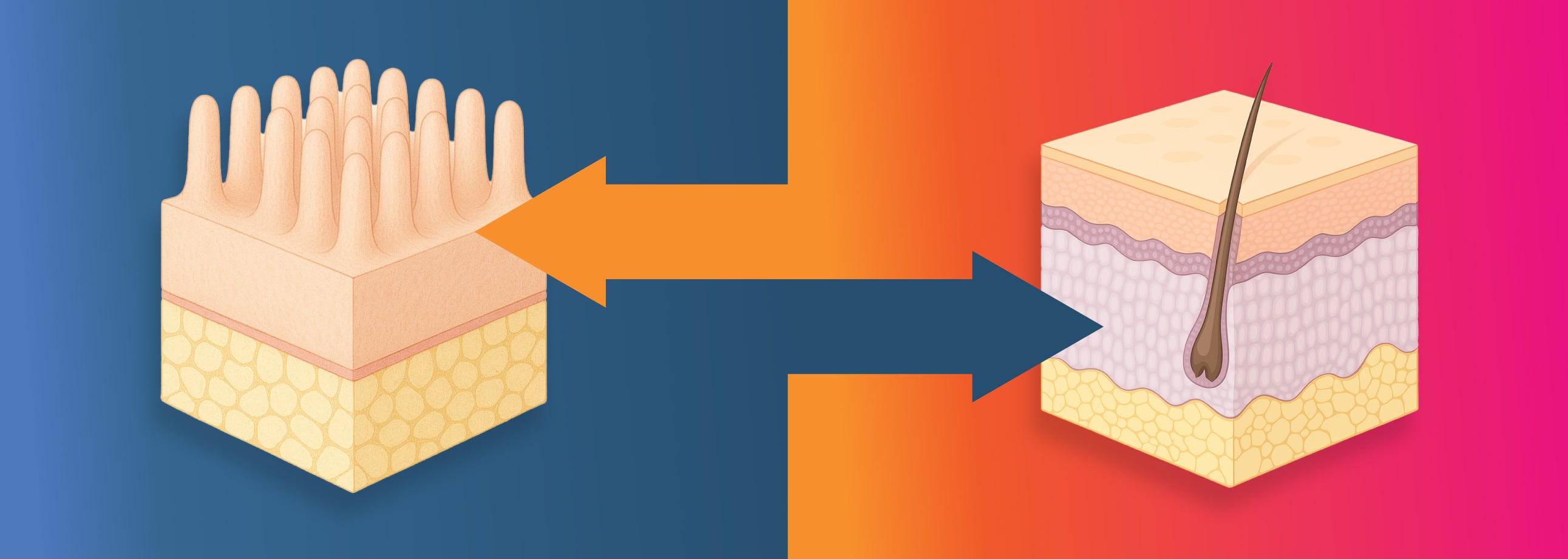A new understanding of the gut-skin axis, a crucial area of research for skin health, is helping to introduce novel dietary skincare therapies with probiotic blends and herbal compounds that address primary causes of skin aging.
An emerging study conducted by Vidya Herbs shows skin-supporting probiotic herbal compounds can nourish a healthy gut microbiome and internally provide the skin with nutrients to improve skin barrier function for enhanced hydration, elasticity, and reduced photoaging.
“The convergence of nutrition and skincare in nutricosmetics represents a paradigm shift in how we approach beauty,” says Rishi Trivedi, PhD, Vidya Herbs’ Global Commercial Director. “The days of treating skin as an isolated organ are over. A holistic approach, encompassing both supplements and topical treatments, is the key to radiant skin.”
Scientific advances like this study, led by Raja Sivamani, MD, MS, AP, and board-certified dermatologist at Integrative Skin Science and Research, are creating significant opportunities in the dietary supplement industry for innovation and change in the skincare sector. This drives the development of more effective, personalized, and holistic skincare solutions that rely on efficient, clean, sustainable extraction techniques, advanced formulation technologies, and encapsulation methods.1
Mintel reports that a core consumer value in the dietary supplements market is the importance of the gut microbiome for holistic and preventive health.2 According to landscape studies, ingestible skincare ingredients with probiotics and other supporting compounds have unexplored market opportunities and, as such, have the potential to disrupt the existing anti-aging skincare market.3,4
A probiotic-botanical blend for the gut-skin axis
The growing market for supplements that support skin health is ideally situated at the intersection of greater awareness of the gut microbiome and high demand for ceramides and ingredients to reduce the risk of sun damage. Many skincare ingredients address single causes of skin damage.
Vidya’s investment in skincare and science aims to address all of these issues with a three-pronged ingredient blend called BioticalTM GS, including probiotics to support the gut-skin axis, ceramides for hydration, and astaxanthin to reduce the risk of photoaging.
A recent clinical study on Biotical GS conducted by Vidya establishes the gut-skin axis and reveals that when probiotics are combined with ceramide-supporting ingredients and carotenoids that reduce photoaging, there is a significant decrease in wrinkle severity, and improvement in firmness, net elasticity, and skin viscoelasticity (SVE) (clinical study manuscript in preparation with expected release during Q4, 2024).5

“This isn’t just another beauty product – it’s a scientifically formulated, multi-faceted approach revolutionizing how we think about skin health. Imagine a solution so comprehensive, it doesn’t just mask aging – it transforms skin from the inside out,” says Dr. Trivedi.
While elasticity is the skin’s ability to expand and contract or bounce back, the skin’s actual movement is more complex and involves viscoelasticity. Skin viscoelasticity (SVE) is the structural biomechanics of how much ‘give’ the skin has for immediate and time-dependent responses to mechanical stress.6 Simply put, SVE measures how well the skin is protected from injury caused by sun damage, aging, and prolonged illness.
Probiotics have emerged as a promising avenue for regulating skin health through their influence on the gut-skin axis. This intricate connection between the gut microbiome and skin health involves a dynamic interplay, including reducing oxidative stress, suppressing inflammatory responses, and modulation of immune function.4,7
These diverse mechanisms underscore the complex relationship between the gut microbiome and skin health. By targeting the gut-skin axis, probiotics offer a holistic approach to improving skin conditions and promoting overall skin wellbeing.
“Probiotics are not just for gut health; they’re the unseen architects of skin vitality, and through the intricate gut-skin axis, these beneficial microbes orchestrate a symphony of cellular processes,” says Dr. Trivedi.
Combining the power of probiotics with proven herbal ingredients
In 2020, Vidya Probiotics launched Skin-Cera® which includes ceramides from sustainably grown Japanese konjac root in response to the demand for a gluten-free option.8 Since then, products with ceramides have continued to gain consumer recognition and show robust growth.9
Ceramides are vital to improving barrier functions to keep the skin moist and elastic; however, with aging, the skin loses this ability, which increases the appearance of wrinkles. Studies on Skin-Cera suggest ingested ceramides may provide support by activating ceramide synthesis.8
Astaxanthin, derived from algae, is a potent antioxidant that offers numerous health benefits by protecting cells from damage caused by free radicals. This antioxidant may help improve skin health by reducing inflammation and promoting collagen production. The combination of astaxanthin, probiotics and Skin-Cera is unique because it provides multiple skin health benefits.
“Our groundbreaking cosmeceutical is a masterful fusion of probiotics, konjac root ceramides, and astaxanthin, meticulously crafted to revitalize the skin and unveil its true potential. Together, these powerful ingredients synergize to nourish, protect, and rejuvenate, offering a radiant complexion that reflects health and vitality,” says Dr. Trivedi.
Though cosmeceuticals, or the beauty-from-within concept, have existed since 1984, recent gains in Vidya’s clinical research involving the gut-skin axis have built an even stronger foundation.10 The reciprocal relationship between the gut microbiome and skin is essential for maintaining healthy skin elasticity and hydration.
With over two decades of expertise, Vidya Herbs is a globally recognized manufacturer of premium, sustainable biotics, herbal extracts, ingredients, and innovative services. Vidya diligently pursues scientific innovation with cutting-edge R&D while maintaining a focus on social and environmental responsibility.
References
1. ERDYN. Science as an Innovation Strategy in Cosmetics.
2. Mintel. The Future of Vitamins, Minerals and Supplements 2024.
3. Mintel. Patent Insights: Delay Skin Ageing with Ingestibles.
4. Yadav, N.; Ajmal, G.; Kumar Kumawat, M.; et al. (2022). Probiotic in Cosmetics: A Patents Landscape Study: Life Sciences-Microbiology. International Journal of Life Science and Pharma Research, 13(SP 1), L48-L61.
5. Trivedi, R.R.; Nayak, S.; et al. A Double-Blinded, Randomized Placebo Controlled Study of an Oral Herbal Supplement on Photoaged Skin and Elasticity. Manuscript in preparation.
6. Everett, J. S.; & Sommers, M. S. (2013). Skin viscoelasticity: physiologic mechanisms, measurement issues, and application to nursing science. Biological research for nursing, 15(3), 338–346.
7. Majeed, M.; Nagabhushanam, K.; et al. A Randomized Double-Blind, Placebo-Controlled Study to Evaluate the Anti-Skin-Aging Effect of LactoSporin - The Extracellular Metabolite from Bacillus coagulans (Weizmannia coagulans) MTCC 5856 in Healthy Female Volunteers. Clin Cosmet Investig Dermatol. 2023;16:769-782.
8. Heggar Venkataramana, S.; Puttaswamy, N.; Kodimule, S.; et al. (2020). Potential benefits of oral administration of AMORPHOPHALLUS KONJAC glycosylceramides on skin health - a randomized clinical study. BMC Complement Med Ther. 20(1):26.
10. Kligman A. (2005). The future of cosmeceuticals: an interview with Albert Kligman, MD, PhD. Interview by Zoe Diana Draelos. Dermatologic surgery : official publication for American Society for Dermatologic Surgery [et al.], 31(7 Pt 2), 890–891.





